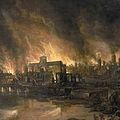Wikipedia:Selected anniversaries/September 2
This is a list of selected September 2 anniversaries that appear in the "On this day" section of the Main Page. To suggest a new item, in most cases, you can be bold and edit this page. Please read the selected anniversaries guidelines before making your edit. However, if your addition might be controversial or on a day that is or will soon be on the Main Page, please post your suggestion on the talk page instead.
Please note that the events listed on the Main Page are chosen based more on relative article quality and to maintain a mix of topics, not based solely on how important or significant their subjects are. Only four to five events are posted at a time and thus not everything that is "most important and significant" can be listed. In addition, an event is generally not posted this year if it is also the subject of the scheduled featured article or picture of the day.
To report an error when this appears on the Main Page, see Main Page errors. Please remember that this list defers to the supporting articles, so it is best to achieve consensus and make any necessary changes there first.
Images
Use only ONE image at a time
-
Emperor Napoleon III of the Second French Empire
-
Battle of Actium
-
Sir Horatio Kitchener
-
Great Fire of London
-
Japanese Foreign Minister Mamoru Shigemitsu signing the Instrument of Surrender
-
Editorial cartoon showing Theodore Roosevelt carrying a big stick
-
Bust of Caesarion
Ineligible
| Blurb | Reason |
|---|---|
| Democracy Day among Tibetan exiles (1960); | unreferenced |
| 31 BC – Final War of the Roman Republic: Troops supporting Octavian defeated the forces of Mark Antony and Cleopatra in the naval Battle of Actium on the Ionian Sea near Actium in Greece. | refimprove |
| 1870 – Franco-Prussian War: Prussian forces captured Napoleon III in Sedan, France; the Second French Empire collapsed within days. | needs more footnotes |
| 1898 – Mahdist War: Forces led by Horatio Kitchener defeated Sudanese tribesmen at the Battle of Omdurman in Omdurman, Khartoum, Sudan, establishing British dominance in northeastern Africa. | refimprove section |
| 1935 – The Labor Day Hurricane struck the Florida Keys, killing at least 423 people. | needs more footnotes |
Eligible
- 47 BC – Caesarion, possibly the son of Julius Caesar, became the last king of the Ptolemaic dynasty of Egypt, ruling jointly with his mother Cleopatra.
- 1649 – Forces loyal to Pope Innocent X destroyed the ancient Italian city of Castro, ending the Wars of Castro.
- 1666 – A large fire began on London's Pudding Lane and burned the city for three days, destroying St Paul's Cathedral and the homes of 70,000 of the city's 80,000 inhabitants.
- 1807 – The British Royal Navy began their bombardment of Copenhagen to capture the Dano-Norwegian navy.
- 1885 – White miners in Rock Springs, Wyoming, US, attacked Chinese immigrants, killing at least 28 Chinese miners and causing approximately US$150,000 in property damage.
- 1901 – U.S. Vice President Theodore Roosevelt first publicly used the phrase "speak softly and carry a big stick" at the Minnesota State Fair, describing his philosophy of negotiating peacefully while simultaneously threatening to use military force.
- 1945 – On the deck of the United States Navy battleship Missouri in Tokyo Bay, representatives from the Empire of Japan and several Allied Powers signed the Japanese Instrument of Surrender, formally ending World War II.
- 1967 – Paddy Roy Bates proclaimed HM Fort Roughs, a former Second World War Maunsell Sea Fort in the North Sea off the coast of Suffolk, England, as an independent sovereign state: the Principality of Sealand.
- 1992 – An estimated magnitude 7.2 earthquake off the coast of Nicaragua was the first tsunami earthquake to be captured on modern broadband seismic networks.
- 1998 – Swissair Flight 111, en route from New York City to Geneva, crashed into the Atlantic Ocean, killing all 229 people on board.
Notes
- Theodore Roosevelt appears on September 14, so Big Stick should not appear in the same year.
September 2: National Day in Vietnam (1945)
- 1792 – French Revolution: Due to an overwhelming fear that foreign armies would attack Paris and prisoners would revolt, thousands of people were summarily executed.
- 1864 – American Civil War: Union forces entered Atlanta, Georgia, a day after the Confederate defenders fled the city, bringing the Atlanta Campaign to a close.
- 1946 – The interim government of India, headed by Jawaharlal Nehru (pictured), was formed to assist the transition of India from British rule to independence.
- 1957 – President Ngô Đình Diệm of South Vietnam became the first foreign head of state to make a state visit to Australia.
- 1990 – Transnistria unilaterally declared its independence from what was then the Moldavian SSR of the Soviet Union, but it remains only a partially recognised state.








